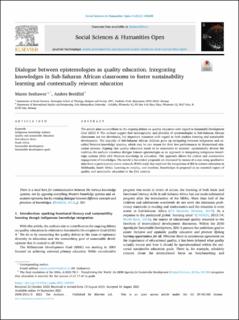Dialogue between epistemologies as quality education: Integrating knowledges in Sub-Saharan African classrooms to foster sustainability learning and contextually relevant education
Peer reviewed, Journal article
Published version
Permanent lenke
https://hdl.handle.net/11250/3024968Utgivelsesdato
2021Metadata
Vis full innførselSamlinger
Sammendrag
The article aims to contribute to the ongoing debate on quality education with regard to Sustainable Development Goal (SDG) 4. The authors suggest that heterogeneity and plurality of epistemologies in Sub-Saharan African classrooms are not drawbacks, but important resources with regard to both student learning and sustainable development. The majority of Sub-Saharan African children grow up navigating between indigenous and socalled Western knowledge systems, which may be one reason for their low performances in Westernised education systems. Arguing that quality education needs to be responsive to students’ epistemically diverse life realities, the authors introduce dialogue between epistemologies as an approach to integrating indigenous knowledge systems (IKS) with Western knowledge in education. This approach allows for critical and constructive engagement of knowledges. The article’s theoretical proposals are discussed by means of a case using qualitative data from a participatory action research (PAR) study that explored the integration of IKS in science education in Makhanda, South Africa. Learning to employ, and combine, knowledges is proposed as an essential aspect of quality and sustainable education in the 21st century

